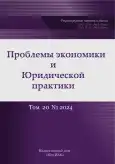Development of a Binary Classification Model Based on Small Data Using Machine Learning Methods
- Authors: Mikhaylova S.S.1, Grineva N.V.1
-
Affiliations:
- Financial University under the Government of the Russian Federation
- Issue: Vol 20, No 1 (2024)
- Pages: 129-140
- Section: Mathematical, Statistical and Instrumental Methods in Economics
- URL: https://bakhtiniada.ru/2541-8025/article/view/284309
- DOI: https://doi.org/10.33693/2541-8025-2024-20-1-129-140
- EDN: https://elibrary.ru/WFJKOK
- ID: 284309
Cite item
Abstract
Today, solutions to the problem of binary classification using machine learning find applications in a huge number of spheres of life, such as medicine, energy, marketing, agriculture, financial analytics, etc. This is a great opportunity for companies to gain new sources of profit and improve existing processes. Therefore, new solution methods are being actively developed, existing ones are being improved, and research is being conducted on the possibility of using machine learning to solve classification problems in various fields. The study of the effectiveness of using various machine learning methods, taking into account the existing problems of small data in solving the problem of binary classification, is very relevant due to the significant preponderance of developments towards Big Data. For small data, possible problems that affect the effectiveness of the trained model have been identified, and various options for solving these problems have been proposed. To assess the impact of small data problems on the quality of the trained model, a comparative analysis of the quality metrics of models trained on different variations of data processing was carried out. It is concluded that correct work with small data requires timely elimination of such data defects as class imbalance, outliers, etc. In the course of the study, the most significant quality metrics were selected to obtain a model for analyzing medical parameters. A comparative analysis of diabetes detection models based on preprocessed small data has been carried out. For the task under consideration, the stacking model was chosen as the best option for medical use. The results of the analysis showed that machine learning is able to show high efficiency in solving real problems of binary classification.
Full Text
##article.viewOnOriginalSite##About the authors
Svetlana S. Mikhaylova
Financial University under the Government of the Russian Federation
Author for correspondence.
Email: ssmihajlova@fa.ru
ORCID iD: 0000-0001-9183-8519
Dr. Sci. (Econ.), Associate Professor, Professor, Department of Data Analysis and Machine Learning, Faculty of Information Technology
Russian Federation, MoscowNatalia V. Grineva
Financial University under the Government of the Russian Federation
Email: ngrineva@fa.ru
ORCID iD: 0000-0001-7647-5967
Cand. Sci. (Econ.), Associate Professor, Associate Professor of the Department of Data Analysis and Machine Learning
Russian Federation, MoscowReferences
- Fahad B. Mostafa, Easin Hasan Machine Learning Approaches for Binary Classification to Discover Liver Diseases using Clinical Data : diss. Texas, 2021. —23 p.
- Bashayer Fouad Marghalani, Muhammad Arif Automatic Classification of Brain Tumor and Alzheimer’s Disease in MRI // Procedia Computer Science. —2019. —№163. —P. 78–84.
- Enrique Peláez, Ricardo Serrano, Geancarlo Murillo, Washington Cárdenas A Comparison of Deep Learning Models for Detecting COVID-19 in Chest X-ray Images // IFAC-PapersOnLine. —2021. —№54. —P. 358–363.
- Lamir Shkurti, Faton Kabashi, Vehebi Sofiu, Arsim Susuri Performance Comparison of Machine Learning Algorithms for Albanian News articles // IFAC-PapersOnLine. —2022. —№55. —P. 292–295.
- I.-M. Sarivan, Johannes N. Greiner, D. Díez Álvarez, F. Euteneuer, M. Reichenbach, O. Madsen, S. BøghEnabling Real-Time Quality Inspection in Smart Manufacturing Through Wearable Smart Devices and Deep Learning // Procedia Manufacturing. —2020. —№51. —P. 373–380.
- Qingqing Zhang, Jiyang Zhang, Jianxiao Zou, Shicai Fan A Novel Fault Diagnosis Method based on Stacked LSTM // IFAC-PapersOnLine. —2020. —№53. —P. 790–795.
- Grineva N.V., Mikhailova S.S. Application of machine learning for modeling borrower default // Innovations and investments. 2023. No. 4. pp. 254–262. EDN: MWZQEK.
- Grineva N.V., Mikhailova S.S., Kontsevaya N.V., Econometric modeling of the company's intellectual capital in the context of digitalization// In the collection: Management of large-scale system development. 2023. EDN: EKPRPM.
- Krinichansky K., Grineva N. Dynamic approach to the analysis of financial structure: overcoming the bank-based vs market-based dichotomy// In the collection: 2023 16th International Conference Management of large-scale system development (MLSD). 2023. EDN: RSHSND, doi: 10.1109/MLSD58227.2023.10303933.
- Semyonova P.A., Grineva N.V., Mikhailova S.S. Preliminary data analysis and construction of features in the problem of forecasting supply volumes // Problems of economics and legal practice. 2023. T. 19. No. 3. P. 141–152. EDN: CALJPF.
- Strzelecka, A. Application of logistic regression models to assess household financial decisions regarding debt / A. Strzelecka, A. Kurdyś-Kujawska, D. Zawadzka // Procedia Computer Science —2022. —№176.
- Application of Support Vector Machine for Prediction of Medication Adherence in Heart Failure Patients / S. Youn-Jung, K. Hong-Gee, K. Eung-Hee, C. Sangsup // Healthc Inform Res. —16(4). —Korea : The Korean Society of Medical Informatics, 2010. —P. 253–259.
- Analysis of Image Classification using SVM / G. Sai Surya Teja, G. Yogeshwara Sai Varun, G. Bhanu Rama Ravi Teja [и др.] // 12th International Conference on Computing Communication and Networking Technologies (ICCCNT). —Kharagpur, India : IEEE, 2021. —P. 1–6.
- Pengcheng Xu, Xiaobo Ji, Minjie Li & Wencong Lu Small data machine learning in materials science // npj Computational Materials. —2023. —№9.
- Hui Wang, Ivo Duentsch, Gongde Guo & Sadiq Ali Khan Special issue on small data analytics // International Journal of Machine Learning and Cybernetics. —2023. —№14.
Supplementary files












